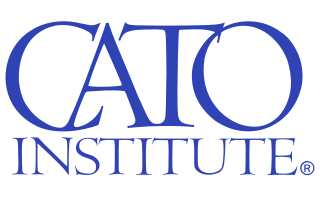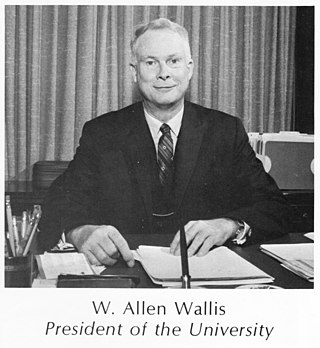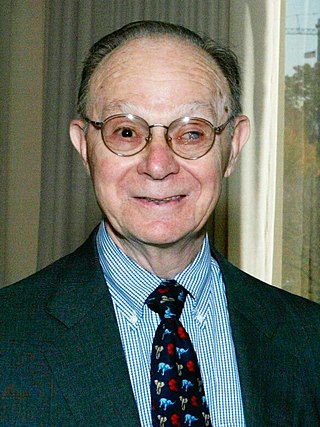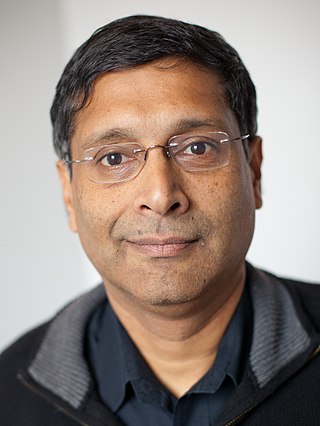
The International Monetary Fund (IMF) is a major financial agency of the United Nations, and an international financial institution funded by 190 member countries, with headquarters in Washington, D.C. It is regarded as the global lender of last resort to national governments, and a leading supporter of exchange-rate stability. Its stated mission is "working to foster global monetary cooperation, secure financial stability, facilitate international trade, promote high employment and sustainable economic growth, and reduce poverty around the world."

The Cato Institute is an American libertarian think tank headquartered in Washington, D.C. It was founded in 1977 by Ed Crane, Murray Rothbard, and Charles Koch, chairman of the board and chief executive officer of Koch Industries. Cato was established to focus on public advocacy, media exposure and societal influence.
The Mont Pelerin Society (MPS), founded in 1947, is an international organization of economists, philosophers, historians, intellectuals and business leaders. It has been described as neoliberal in its ideological orientation, though some scholars claim that it is classically liberal. It is headquartered at Texas Tech University in Lubbock, Texas. The society advocates freedom of expression, free market economic policies and the political values of an open society. Further, the society seeks to discover ways in which the private sector can replace many functions currently provided by government entities.

Martin Stuart Feldstein was an American economist. He was the George F. Baker Professor of Economics at Harvard University and the president emeritus of the National Bureau of Economic Research (NBER). He served as president and chief executive officer of the NBER from 1978 to 2008. From 1982 to 1984, Feldstein served as chairman of the Council of Economic Advisers and as chief economic advisor to President Ronald Reagan. Feldstein was also a member of the Washington-based financial advisory body the Group of Thirty from 2003.

Steve H. Hanke is an American economist and professor of applied economics at the Johns Hopkins University in Baltimore, Maryland. He is also a senior fellow at the Independent Institute in Oakland, California, and co-director of the Johns Hopkins University's Institute for Applied Economics, Global Health, and the Study of Business Enterprise in Baltimore, Maryland.
The Mercatus Center is an American libertarian, free-market-oriented non-profit think tank. The Mercatus Center is located at the George Mason University campus, however the organization is privately funded and its employees are independent of the university. It is directed by Daniel M. Rothschild and its board is chaired by American economist Tyler Cowen. The Center works with policy experts, lobbyists, and government officials to connect academic learning with real-world practice. Taking its name from the Latin word for market, the center advocates free-market approaches to public policy. During the George W. Bush administration's campaign to reduce government regulation, The Wall Street Journal reported, "14 of the 23 rules the White House chose for its 'hit list' to eliminate or modify were Mercatus entries".
Otmar Issing is a German economist who served as a member of the Executive Board of the European Central Bank from 1998 to 2006 and concurrently as ECB chief economist. He developed the 'two-pillar' approach to monetary policy decision-making that the ECB has adopted. After leaving the executive board, Issing been serving as president of the Center for Financial Studies since 2006.

Wilson Allen Wallis was an American economist and statistician who served as president of the University of Rochester. He is best known for the Kruskal–Wallis one-way analysis of variance, which is named after him and William Kruskal.

Allan H. Meltzer was an American economist and Allan H. Meltzer Professor of Political Economy at Carnegie Mellon University's Tepper School of Business and Institute for Politics and Strategy in Pittsburgh, Pennsylvania. Meltzer specialized on studying monetary policy and the US Federal Reserve System, and authored several academic papers and books on the development and applications of monetary policy, and about the history of central banking in the US. Together with Karl Brunner, he created the Shadow Open Market Committee: a monetarist council that deeply criticized the Federal Open Market Committee.

William Poole was the eleventh chief executive of the Federal Reserve Bank of St. Louis. He took office on March 23, 1998, and began serving his full term on March 1, 2001. In 2007, he served as a voting member of the Federal Open Market Committee, bringing his District's perspective to policy discussions in Washington. Poole stepped down from the Fed on March 31, 2008.

Lúcio Vinhas de Souza is a Brazilian Born-Portuguese economist. His main research areas are global macroeconomics, development economics, monetary economics, finance and country risk, with extensive work experience at the developed economies of the European Union and the US, and in several emerging market regions, from the former Soviet Union to East Asia, Africa and Latin America.

Daniel J. "Dan" Mitchell is a libertarian economist and former senior fellow at the Cato Institute. He is a proponent of the flat tax and tax competition, financial privacy, and fiscal sovereignty.

Manuel Sánchez is a Mexican economist with a wide-ranging professional career that includes positions in academics, banking, and central banking. He was nominated by President Felipe Calderón Hinojosa on April 23, 2009, as Deputy Governor and member of the Board of Governors at Banco de México, Mexico's central bank, for a term that ended on December 31, 2016. His appointment was ratified by the Standing Commission of the Mexican Congress on May 27, 2009.

David Richard Henderson is a Canadian-born American economist and author who moved to the United States in 1972 and became a U.S. citizen in 1986, serving on President Ronald Reagan's Council of Economic Advisers from 1982 to 1984. A research fellow at Stanford University's Hoover Institution since 1990, he took a teaching position with the Naval Postgraduate School in Monterey, California in 1984, and is now an emeritus professor of economics.
W. Michael Cox is an American economist, speaker, and consultant. An outspoken libertarian, he comments on society, politics, and the benefits of a free market society. Cox is currently the Director of the O’Neil Center for Global Markets and Freedom at Southern Methodist University's Cox School of Business.

Arvind Subramanian is an Indian economist and the former Chief Economic Advisor to the Government of India, having served from 16 October 2014 to 20 June 2018. Subramanian is currently a Senior Fellow at the Watson Institute for International and Public Affairs at Brown University. He previously served as Professor of Economics at Ashoka University and a Senior Fellow at the Peterson Institute for International Economics and Center for Global Development.
Jerry L. Jordan is a former member of President Ronald Reagan's Council of Economic Advisers and former president and chief executive officer of the Federal Reserve Bank of Cleveland.

Warren L. Coats, Jr., is an economist specializing in monetary policy. He retired from the International Monetary Fund in May 2003 to join the board of directors of the Cayman Islands Monetary Authority. He is president of Economic Consulting, providing technical assistance to central banks, and until recently was adviser to the central banks of Afghanistan and Kazakhstan.

Phillip Lee "Phill" Swagel is an American economist who is currently the director of the Congressional Budget Office. As Assistant Secretary of the Treasury for Economic Policy from 2006 to 2009, he played an important role in the Troubled Asset Relief Program that was part of the U.S. government's response to the financial crisis of 2007–08. He was recently a Professor in International Economics at the University of Maryland School of Public Policy, a non-resident scholar at the American Enterprise Institute, senior fellow at the Milken Institute, and co-chair of the Bipartisan Policy Center's Financial Regulatory Reform Initiative.

David I. Meiselman was an American economist. Among his contributions to the field of economics are his work on the term structure of interest rates, the foundation today of the implementation of monetary policy by major central banks, and his work with Milton Friedman on the impact of monetary policy on the performance of the economy and inflation.















